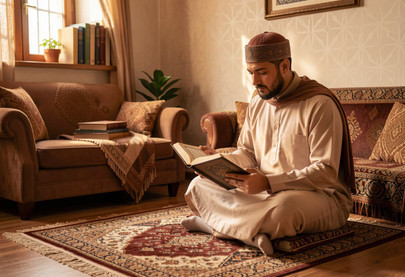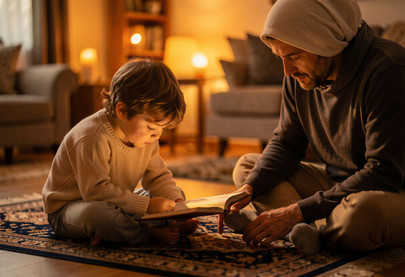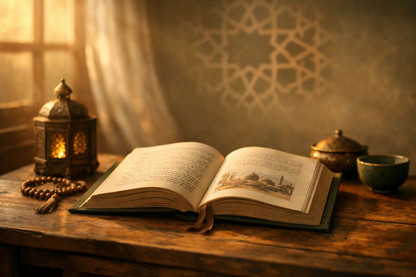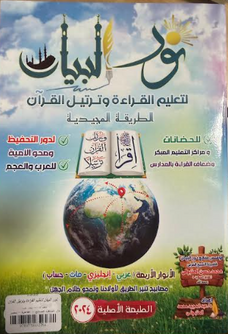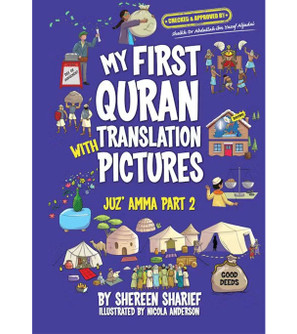A Season of Sacrifice and Spirituality in Eid-Al-Adha
A Season of Sacrifice and Spirituality in Eid-Al-Adha
Eid-Al-Adha, also known as the Festival of Sacrifice, is one of the most sacred and widely celebrated holidays in the Islamic calendar. Marking the end of the Hajj pilgrimage and commemorating the devotion of Prophet Ibrahim (AS), this celebration goes far beyond just festivities. It is a time for reflection, gratitude, and recommitment to faith and family values.
Whether you are a parent trying to teach your child the deeper meaning of Eid-Al-Adha, a new Muslim exploring Islamic traditions, or simply someone wanting to strengthen your connection with your deen, understanding the significance of this blessed season can help you appreciate the richness of our spiritual heritage.
What Eid-Al-Adha Commemorates
Eid-Al-Adha falls on the 10th day of Dhul-Hijjah, the final month in the Islamic lunar calendar. It honors the obedience of Prophet Ibrahim (AS), who was willing to sacrifice his beloved son Ismail (AS) as an act of submission to Allah. Just as Ibrahim was about to carry out the command, Allah replaced his son with a ram, signifying a divine act of mercy and approval of his unwavering faith.
Muslims around the world commemorate this act by performing Qurbani (the ritual sacrifice of an animal), distributing the meat to those in need, and gathering for community prayer. The significance of Eid-Al-Adha lies not just in the actions themselves, but in the values they teach—faith, sacrifice, gratitude, and compassion.
If you're looking for a meaningful and child-friendly way to explain this story, the Hajj and Eid Al-Adha Activity Book is a great starting point. Created by Green Fig Books, this workbook includes stories, critical thinking activities, math exercises, and hands-on fun that help children retain both academic and religious knowledge. It is suitable for ages 8 and up and is available at Madinah Media.
How Eid-Al-Adha Is Connected to Hajj
Eid-Al-Adha is closely tied to the annual pilgrimage of Hajj. As pilgrims complete rituals in Mina, Arafah, and Muzdalifah, those not on Hajj reflect on their own journey of submission and spiritual renewal. The timing of Eid-Al-Adha reminds Muslims everywhere of the importance of unity, humility, and the collective experience of the ummah.
One of the most beautiful ways to connect your child to this powerful season is through storytelling. The Siraj and Eid Al-Adha Gift Box, also available from Green Fig Books, does exactly that. In this book, young Siraj learns about the Hajj journey through the gifts his parents bring home after their pilgrimage. The story incorporates lessons about Prophet Muhammad ﷺ, the significance of Hajj, and the joy of Eid in a way that sparks curiosity and faith in young readers.
Teaching Children the Meaning of Eid-Al-Adha
For many families, Eid-Al-Adha can feel hard to explain to children, especially when compared to the excitement of Eid after Ramadan. The key is to shift the focus from just the rituals to the deeper meanings behind them.
What does it mean to trust Allah? What does it mean to give something up for a higher purpose? Why do we share with others during Eid?
These are powerful questions, and they can open the door to meaningful conversations when introduced with care and age-appropriate materials. Once again, the Hajj and Eid Al-Adha Activity Book shines in this area. With its blend of engaging visuals and educational content, it empowers children to reflect while still having fun.
You could also create your own family traditions around these teachings. For example, reading a story about Hajj together before bed, preparing meat for charity as a family, or writing thank you notes to people who have made sacrifices for your child—teachers, elders, or community members. Small actions like these build emotional connection and moral understanding.
Sunnahs of Eid-Al-Adha You Might Not Know
Eid-Al-Adha is filled with beautiful Sunnahs that help us experience the day with purpose and intention. From performing ghusl in the morning to reciting the takbir before the prayer, greeting others with warm words, and walking to the prayer area when possible—each of these practices is rooted in the example of Prophet Muhammad ﷺ.
However, many Muslims may not know all the Sunnahs or how to properly perform them. That is where the book The Rulings of the Two Eids becomes incredibly useful. This concise and clear guide from the International Islamic Publishing House breaks down everything you need to know about both Eid-Al-Fitr and Eid-Al-Adha. It includes information on Eid prayers, Zakat al-Fitr, the rules of Qurbani, and common mistakes to avoid.
This book is a must-read for anyone who wants to celebrate Eid in a way that is both joyful and correct according to Islamic teachings. It also serves as an excellent refresher for adults and a learning tool for teens.
Creating Family Traditions During Eid-Al-Adha
Every Muslim family has an opportunity to create meaningful and lasting Eid traditions that teach Islamic values while making the holiday feel special. The beauty of Eid-Al-Adha lies in the balance between worship and celebration.
You can begin by decorating your home with simple but intentional décor. Involve your children in choosing clothes, preparing food for neighbors, and wrapping small gifts. Most importantly, help them understand why we do these things. It is not just about having fun—it is about remembering Allah and living with purpose.
Books like the Siraj and Eid Al-Adha Gift Box can become part of your Eid tradition. You can read it every year, discuss the story as a family, and even create your own “gift box” with Islamic items like prayer beads, children’s books, or handwritten du’as.
And for older children, incorporating activity books like the Hajj and Eid Al-Adha Activity Book during Dhul-Hijjah can help them stay engaged while deepening their knowledge.
Why Eid-Al-Adha Still Matters Today
In a world that often pushes us to focus on material things, Eid-Al-Adha invites us to pause, reflect, and reconnect with what truly matters. It is a time to remember our duty to Allah, to those in need, and to our families. The lessons of sacrifice and sincerity are timeless, and they remain deeply relevant in today’s fast-paced society.
Whether you are preparing for Eid with your children, your spouse, your parents, or just by yourself, bringing intention and knowledge into your celebration can transform the experience.
With resources like The Rulings of the Two Eids, Siraj and Eid Al-Adha Gift Box, and Hajj and Eid Al-Adha Activity Book, your home can become a place of learning, joy, and deep spiritual connection. These books are not just educational—they are tools for building a stronger relationship with Islam, for both you and your children.
To browse these titles, visit madinahmedia.com and explore more ways to bring meaning into your family's Eid-Al-Adha experience.


